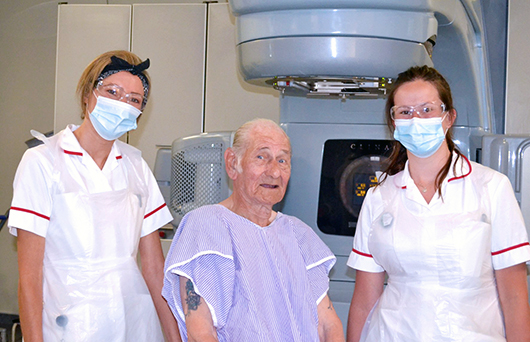Media Release
Date: 18 June 2021
RUH launches new radiotherapy treatment for lung cancer patients
Patients with inoperable lung cancer can now benefit from a new form of radiotherapy treatment being provided by the Royal United Hospitals Bath NHS Foundation Trust.

Lung cancer is only operable in around 18% of patients, mainly due to a higher disease prevalence in patients who are smokers, who often have cardiac or respiratory health conditions which rule out surgery.
The new radiotherapy treatment - Stereotactic Ablative Radiotherapy (SABR) – uses between three to eight high dose radiotherapy sessions to treat early stage, medically inoperable lung cancer.
This is in contrast to conventional radiotherapy treatment, where between 20 and 30 treatments are typically needed.
As well as needing fewer visits to the hospital, patients who have SABR treatment have also been found to have fewer side effects.
Peter Wood, 80, from Bath, was the first patient at the RUH to receive the new radiotherapy treatment. Peter said: "I'm very happy to have been offered this course of treatment and it's marvellous that it's here in my local hospital and really convenient.
"The treatment itself is fairly comfortable, apart from having to keep completely still for an hour, and I've not noticed any discomfort or after-effects. As for the staff – they're brilliant."
Advanced Practitioner Therapeutic Radiographer Alice Potter described Peter as "a model first patient". Lisa Tolson, Radiotherapy Service Manager, said: "It's fantastic that we are now able to provide our patients with this world class service.
"The biggest benefit is that it will improve cancer cure rates for those patients with inoperable lung cancer. "We are also able to offer the treatment to some patients whose disease has spread to their lungs more than six months after their original treatment.
"We're always looking at ways to further improve the care we provide to our patients and I'd like to thank everyone at the RUH who has worked, and trained, so hard to ensure we can provide this ground-breaking treatment." Lung cancer is the third most common cancer in the UK, accounting for around 13% of all new cancer cases (2017 figures).
Radiotherapy can be used to treat cancerous and non-cancerous tumours in almost any part of the body. Radiotherapy uses high energy radiation, usually x-rays or electrons, to treat disease.
Radiotherapy stops cancer cells from dividing properly and as a result they are destroyed.
ENDS

